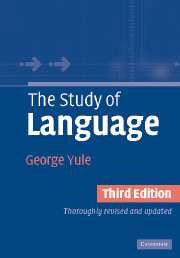Book contents
- Frontmatter
- Contents
- Preface
- The origins of language
- Animals and human language
- The development of writing
- The sounds of language
- The sound patterns of language
- Words and word-formation processes
- Morphology
- Phrases and sentences : grammar
- Syntax
- Semantics
- Pragmatics
- Discourse analysis
- Language and the brain
- First language acquisition
- Second language acquisition/learning
- Gestures and sign languages
- Language history and change
- Language and regional variation
- Language and social variation
- Language and culture
- Appendix: Suggested answers to study questions
- Glossary
- References
- Index
Pragmatics
- Frontmatter
- Contents
- Preface
- The origins of language
- Animals and human language
- The development of writing
- The sounds of language
- The sound patterns of language
- Words and word-formation processes
- Morphology
- Phrases and sentences : grammar
- Syntax
- Semantics
- Pragmatics
- Discourse analysis
- Language and the brain
- First language acquisition
- Second language acquisition/learning
- Gestures and sign languages
- Language history and change
- Language and regional variation
- Language and social variation
- Language and culture
- Appendix: Suggested answers to study questions
- Glossary
- References
- Index
Summary
In the late 1960s, two elderly American tourists who had been touring Scotland reported that, in their travels, they had come to a Scottish town in which there was a great ruined cathedral. As they stood in the ruins, they saw a small boy and they asked him when the cathedral had been so badly damaged. He replied in the war. Their immediate interpretation, in the 1960s, was that he must be referring to the Second World War which had ended only twenty years earlier. But then they thought that the ruins looked as if they had been in their dilapidated state for much longer than that, so they asked the boy which war he meant. He replied the war with the English, which, they eventually discovered, had formally ended in 1745.
Brown (1998)In the previous chapter, we focused on conceptual meaning and the relationships between words. There are other aspects of meaning that depend more on context and the communicative intentions of speakers. In Gill Brown's story, the American tourists and the Scottish boy seem to be using the word war with essentially the same basic meaning. However, the boy was using the word to refer to something the tourists didn't expect, hence the initial misunderstanding. Communication clearly depends on not only recognizing the meaning of words in an utterance, but recognizing what speakers mean by their utterances. The study of what speakers mean, or ‘speaker meaning’, is called pragmatics.
- Type
- Chapter
- Information
- The Study of Language , pp. 112 - 123Publisher: Cambridge University PressPrint publication year: 2005



